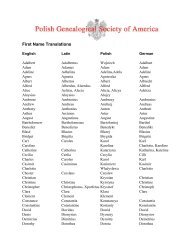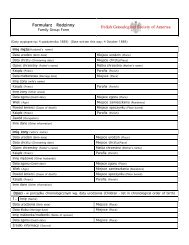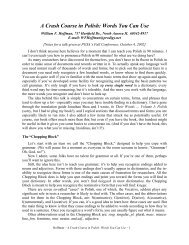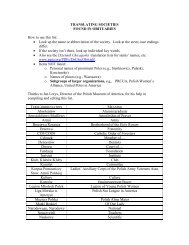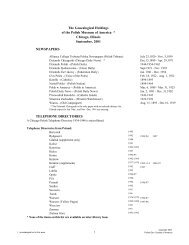Rodziny - Polish Genealogical Society of America
Rodziny - Polish Genealogical Society of America
Rodziny - Polish Genealogical Society of America
Create successful ePaper yourself
Turn your PDF publications into a flip-book with our unique Google optimized e-Paper software.
My Gr e a t-Gr e a t-Gr a n d m o t h e r Wa s a n En e m y Al i e n!!where she helped Agnes with the familychores in a household that seemed never tostop growing. On February 8,1923, at theage <strong>of</strong> 53, Agnes died at home after sufferinga cerebral hemorrhage several daysbefore. Her mother, Michalina, died <strong>of</strong> astroke on August 7, 1925, in the LaSalleCounty Home where she was then living.She was 83 years old.Of all the information I received fromMary, the greatest surprise came in aphoto taken <strong>of</strong> Michalina Skrzypczak. The76-year-old woman looked as if she hadbeen backed up against the wall <strong>of</strong> a policestation. Beneath the picture was herthumb print. The photo was part <strong>of</strong> an alienregistration card issued on July 8, 1918,when she was living with John and AgnesWardynski. And to top it <strong>of</strong>f, the card wassigned by the Peru Chief <strong>of</strong> Police. In the 16years he lived in the United States, JohnSkrzypczak had most likely never appliedfor citizenship, and no one could ever havepredicted the consequences his wife wouldhave to face owing to this seemingly insignificantinaction.It was only then I realized that whilethe First World War was raging throughoutEurope and young men in this country,many <strong>of</strong> them the sons <strong>of</strong> immigrant parents,were preparing for battle to ensurethat our foreign allies would not lose theirfight against the invading German forces,the United States <strong>of</strong> <strong>America</strong> had declaredthat my great-great-grandmother was anenemy alien.[Article to be continued if Homeland Securityprovides original documents.]What does the -wicz mean in <strong>Polish</strong> Surnames?The title <strong>of</strong> this article is an onomatologicalquestion which I am <strong>of</strong>ten askedin Polonia. The answer requires a littleexplaining and is far more complex thanmost people realize. Rather than reply tonumerous people on an individual basis, itis better to utilize the medium <strong>of</strong> a newsletterreaching thousands <strong>of</strong> people simultaneously.It is also important to render myhypotheses in writing for future onomatologistswho may be able to augment myresearch.The suffix in question is not necessarily-wicz, as is so <strong>of</strong>ten erroneously assumed,but is rather the compound suffix -owicz(or -ewicz). Naturally, there are instancesin which surnames have been abbreviated(along with surnames formed fromtoponyms that have been abbreviated),perhaps partly because <strong>of</strong> which syllableis accented, and the preceding vowel o ore has dropped out, leaving only -wicz aftera consonant or vowel other than the aforementioned.Another exception is surnamesin which the final consonant was w beforethe patronymic suffix -icz was added to it(e.g., Borowicz [from Borowy + icz and/orBor + -owicz ], Kawicz [from Kawa + icz ],etc.).As a matter <strong>of</strong> clarification, the wordpatronymic is derived from the Greek πατήρ[patēr], “father” + όνομα [ónoma], “name”by Keith Kaszubik22 <strong>Rodziny</strong>, Spring 2008and denotes hereditary descent from a parentor ancestor. Patronymic and metronymicsurnames are generally polygenetic.The compound suffix -owicz (or -ewicz )denoting “son <strong>of</strong> ” is composed <strong>of</strong> the possessivesuffix -ów (or -ew ) and the patronymicsuffix -icz (or -ycz ). Modern <strong>Polish</strong>orthography dictates that the vowel i isrendered as y after the digraphs cz, rz (ż)and sz. Comapratively few <strong>Polish</strong> surnamesterminate with the suffix -ów (or -ew ),although many East Slavic surnames do,especially Russian.According to several scholars, the suffix-icz is said to be ultimately <strong>of</strong> Russianorigins and was first used, around the time<strong>of</strong> the 11th century, by the <strong>Polish</strong> minor nobilityin the eastern borderlands. The suffixwas originally -ic (or -yc ) and was expandedover time to the modern -icz generally beginningin the 15th century (see Rospond,Stanisław, Gramatyka historyczna językapolskiego [Grammatical History <strong>of</strong> the <strong>Polish</strong>Language], Warszawa, 1971, p. 209).Aleksander Brückner (1856-1939) alsomentions the suffix -ic as having been usedas a diminutive.Because the patronymic suffix originallywas -ic, and taking into considerationthat toponyms are generally much older information than surnames, it is no wonderthat many toponyms formed in Poland, and



